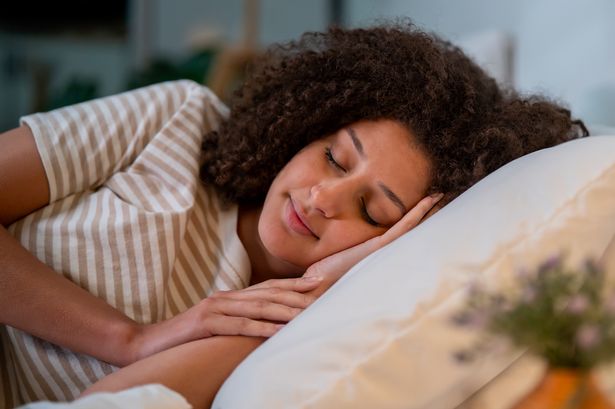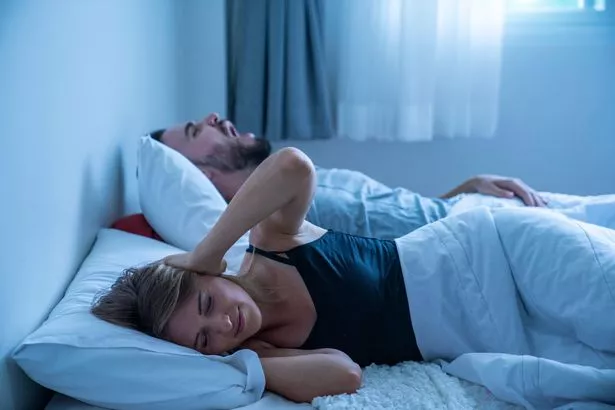The doctor issued a warning for people who notice the sign, as it could signal something serious The NHS doctor shared the warning on social media (stock photo)(Image: Getty)
The NHS doctor shared the warning on social media (stock photo)(Image: Getty)
A doctor is warning people not to dismiss loud snoring and daytime sleepiness. NHS and private GP, Dr Leen Tannous, issued the advice on Instagram. Posting as @doctor.leen, the London-based doctor said she sees patients who dismiss snoring as an “annoying” habit and nothing more.
Whilst it’s typically not cause for concern, the doctor highlighted that loud snoring might indicate sleep apnoea (also known as sleep apnea), “a condition where breathing repeatedly stops during sleep, putting strain on the heart.”
Dr Leen shared the guidance in a post outlining mistakes often made by people who snore, reports the Mirror. The doctor wrote: “As a GP, I see a lot of patients who think snoring is just ‘annoying’ but it can be a sign of something more.
“Here are common mistakes people who snore make: 1. Having alcohol before bed. Alcohol relaxes the muscles in the throat, making the airway more likely to collapse and increasing the volume and frequency of snoring.
“2. Ignoring persistent or loud snoring and daytime sleepiness. These can be signs of sleep apnoea, a condition where breathing repeatedly stops during sleep, putting strain on the heart, lowering oxygen levels, and leaving you exhausted during the day.”
Dr Leen added: “3. Continuing to drive despite excessive daytime sleepiness. Drowsy driving can be just as dangerous as drunk driving, and untreated sleep apnoea significantly raises the risk of road accidents. 4. Using sedatives to help sleep.
“Sleeping pills or sedating medications can relax throat muscles too much, making snoring and sleep apnea worse instead of fixing the root cause. 5. Ignoring lifestyle changes that can help. Weight management, regular exercise, and a balanced diet can reduce snoring and improve overall sleep quality.”
According to the NHS: “Sleep apnoea is when your breathing stops and starts while you sleep. The most common type is called obstructive sleep apnoea (OSA). Sleep apnoea needs to be treated because it can lead to more serious problems.”
Symptoms include:
breathing stopping and starting during sleepmaking gasping, snorting or choking noises during sleepwaking up a lotloud snoringfeeling very tiredfinding it hard to concentratehaving mood swingshaving a headache when you wake up
The NHS adds: “It can be hard to tell if you have sleep apnoea. It may help to ask someone to stay with you while you sleep so they can check for the symptoms.” If someone else has observed your symptoms, it may be helpful to bring them to your GP appointment.
The American Heart Association states: “Sleep apnea increases the risk of CVD and can lead to worse outcomes from cardiovascular disease. Obstructive sleep apnea, in particular, has been linked to higher rates of high blood pressure, stroke, and coronary artery disease. There’s also evidence that sleep apnea can cause left ventricular diastolic dysfunction, which increases the risk of heart failure.”
 Snoring isn’t usually cause for concern, but it could signal something more serious (stock photo)(Image: Getty)
Snoring isn’t usually cause for concern, but it could signal something more serious (stock photo)(Image: Getty)
The British Heart Foundation states: “Sleep apnoea’s connection with the heart is complicated. Some studies have shown an association between sleep apnoea and increased risk of heart attacks and death from cardiovascular causes.
“An association alone doesn’t prove that sleep apnoea actually causes cardiovascular problems, and sleep apnoea and cardiovascular problems have some shared risk factors, such as overweight and obesity. At the moment it hasn’t been shown that treatment for sleep apnoea reduces cardiovascular problems.”
The British Heart Foundation adds: “There is also evidence that sleep apnoea can increase blood pressure in some people. If you have atrial fibrillation (AF, an irregular heart rhythm problem), sleep apnoea can trigger episodes of AF.
“Treating sleep apnoea can bring down high blood pressure, but it is not as effective as blood pressure medication. So, in general, get sleep apnoea treated if it is causing symptoms (usually sleepiness) sufficient to affect your quality of life, not for any benefits to your heart health. If you are concerned about your heart health, talk to your GP.”
Speak to your GP if you have any concerns about your health.

